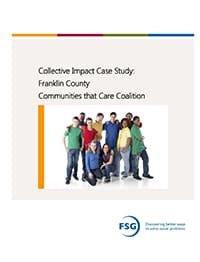Kat Allen, coalition coordinator of the Communities That Care Coalition, discusses a collective impact approach to teen substance abuse prevention in rural Massachusetts.
Franklin County Communities that Care Coalition is a collective impact initiative to reduce substance use and improve the ability of youth to reach their full potential in rural Franklin County, Massachusetts. A resource for collective impact backbone organizations, funders, and partners, this case study provides an overview of the initiative, along with lessons learned.
Top Takeaways
- The fundamentals of the work can happen at the workgroup level: having cross-sectoral, volunteer-staffed workgroups lead the bulk of the work fosters deep understanding of community needs and creates collective ownership of success.
- Be rigid in vision and goals, but flexible in strategy: Collective impact initiatives succeed when they are rigorous in agreeing to what they will accomplish, but adaptive and flexible with strategies to accomplish those goals. Revising its strategy based on a national study indicating that youth who regularly ate dinner with their families were at lower risk of substance abuse, Communities That Care Coalition started a public awareness campaign about family dinners. This change in strategy yielded positive results.
- Leverage relationships to secure collective impact resources: to navigate the challenges presented by its rural context, Communities That Care Coalition built community relationships to attract in-kind support and funding.

